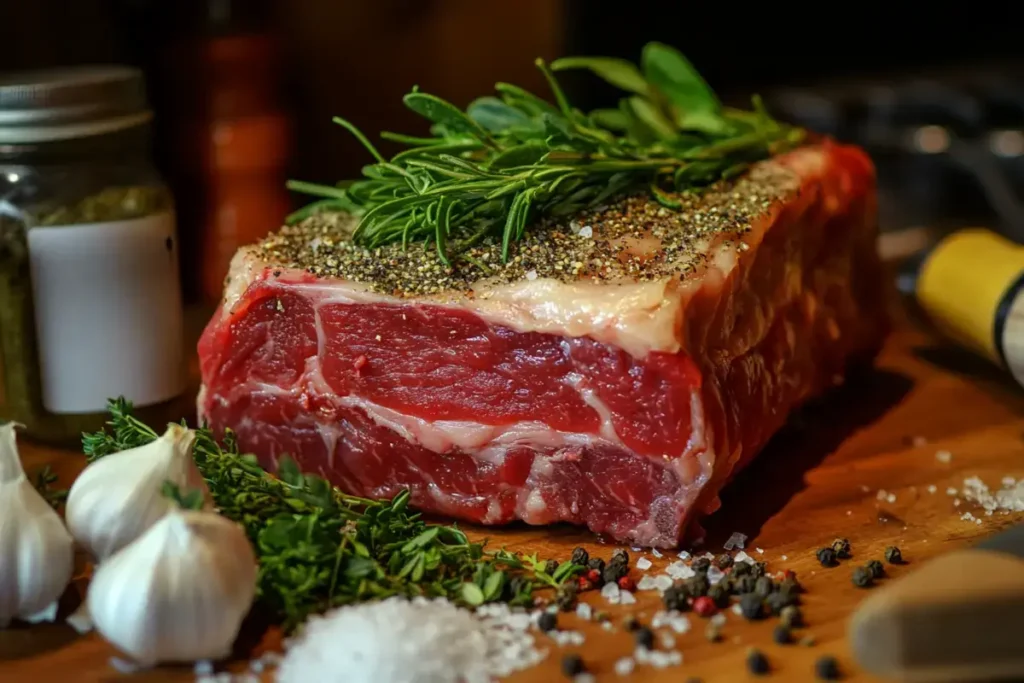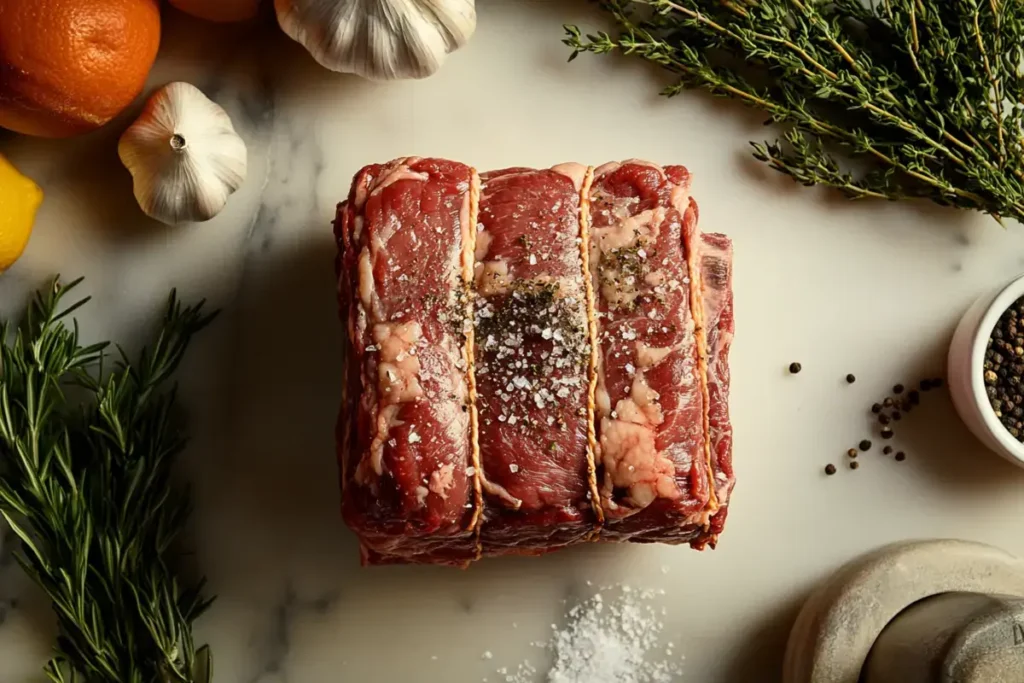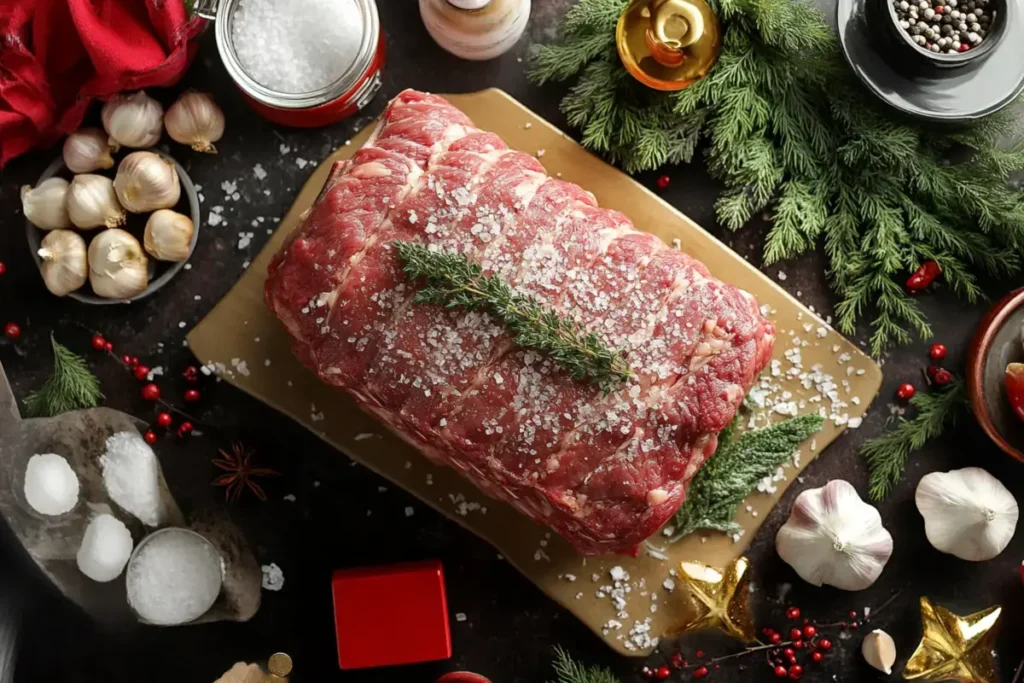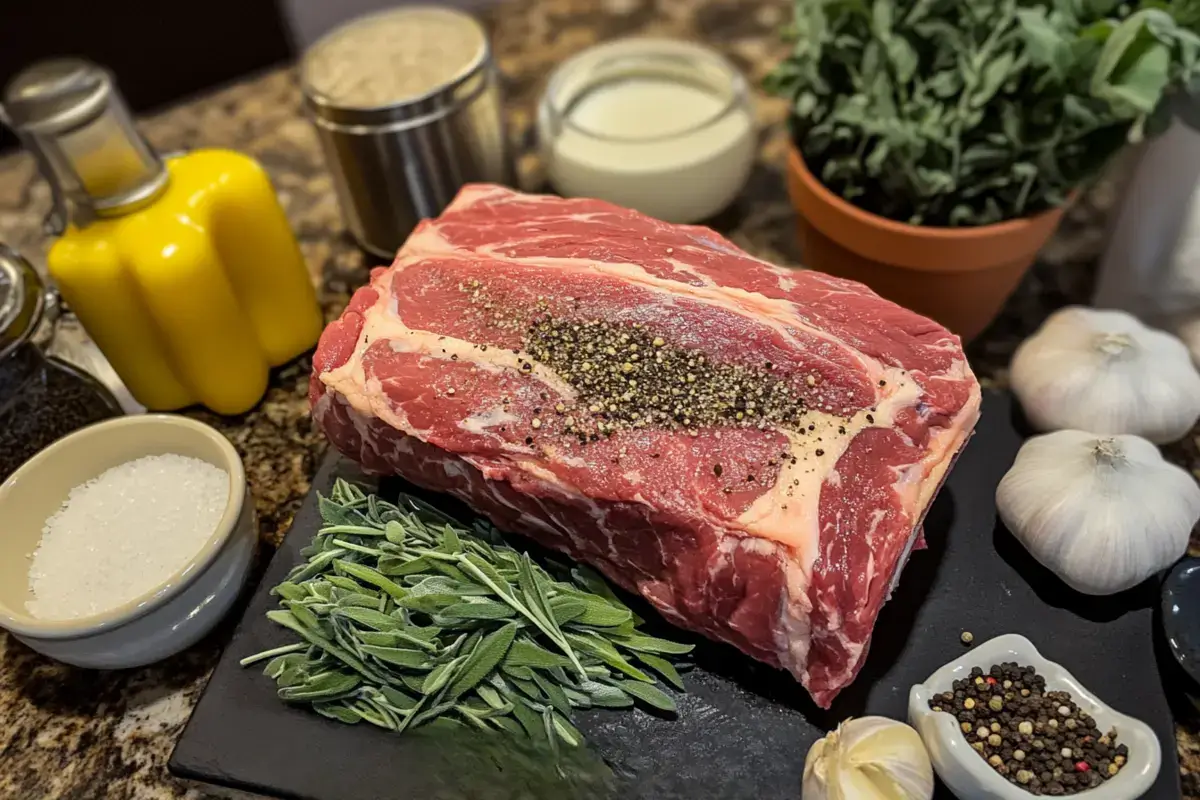Discover if an overnight rub elevates prime rib’s flavor and tenderness. Learn expert tips, seasoning tactics, and cooking insights for a perfect roast.
Introduction
Prime rib is a luscious cut cherished for its robust flavor and rich marbling. It often appears at holiday feasts or special gatherings. However, cooking this fine roast requires careful planning. Many home cooks and chefs debate whether an overnight rub yields the best results. Should you rub a prime rib the night before? This article explores every facet of that question. We will dive into flavor development, cooking techniques, and expert tips that can transform your prime rib from good to truly extraordinary. Indeed, a little preparation can make a big difference in your final dish.
Seasoning meat can seem like a straightforward process. Basically, you choose a spice blend and coat the roast. Nonetheless, several factors influence how well flavors penetrate prime rib. Temperature, rest time, and spice selection all matter. Therefore, we will look at the science behind overnight seasoning and outline how that process benefits texture, aroma, and overall taste. We will also discuss possible pitfalls, like drying out or over-salting. Altogether, this guide aims to answer the big question: Should you rub a prime rib the night before? By the end, you will know the best approach to elevate your prime rib to restaurant-level quality.
Understanding Prime Rib
Prime rib, sometimes referred to as a standing rib roast, comes from the primal rib section of a steer. This section contains beautiful fat marbling, which imparts juiciness and flavor. Moreover, prime rib is prized for its tenderness, making it a showstopper on special occasions. Generally, butchers sell prime rib with multiple ribs still attached. This bone-in presentation can further enhance flavor during cooking. However, you can also find it boneless, which can be easier to handle and carve.
Meanwhile, the marbling in prime rib significantly impacts its taste. The intramuscular fat melts during cooking and enriches the meat with savory notes. Consequently, seasoning this marbled beauty is essential for bringing out its best attributes. The question remains whether that seasoning should happen immediately before cooking or if an overnight wait delivers more significant advantages. Indeed, many cooks swear by letting the meat rest in the fridge after applying a rub, while others prefer to season just before roasting. Let’s delve deeper into why time matters so much when seasoning prime rib.
The Science of an Overnight Rub
When seasonings rest on the meat for an extended period, the salt component works its way into the muscle fibers. Consequently, the roast retains moisture more effectively. Salt breaks down proteins and helps bind water molecules, resulting in a juicier slice of prime rib. Furthermore, garlic, herbs, and other spices also have time to infuse the exterior of the meat. This process can create a deeper, more cohesive flavor profile.
Conversely, if you rub the meat right before cooking, you can still achieve delicious taste. However, you might lose the chance to have spices penetrate below the surface. Especially for large cuts like prime rib, deeper seasoning often means a more uniform flavor in every bite. Conversely, an overnight rub requires extra space in the fridge, time, and planning. Nonetheless, many prime rib enthusiasts insist it is worth the effort. Another crucial factor is how you plan to cook the roast, since each method interacts with the rub in different ways.
Should you rub a prime rib the night before? Expert Overview
Yes, Should you rub a prime rib the night before? is a common inquiry among home cooks. Accordingly, professionals usually recommend doing so. Chiefly, letting the roast sit with seasonings overnight fosters better absorption of salt and other aromatics. Consequently, each slice will taste more robust. Because prime rib is a premium cut, investing extra time in an overnight rest often yields a noteworthy payoff in flavor.
Still, some cooks believe last-minute seasoning can produce a crispier exterior. They argue that any moisture drawn from the meat by salt can hinder browning. However, patting the roast dry before cooking can alleviate that. Another approach involves applying salt well in advance, then adding other seasonings just before roasting. Basically, there are multiple strategies to achieve a stellar result. Nevertheless, most people lean toward an overnight rub, particularly if they seek intense flavor and a succulent bite. Next, we will consider specific pros and cons of this technique.

Should you rub a prime rib the night before? The Pros
Should you rub a prime rib the night before? The advantage is clear: extended contact with spices usually equals deeper flavor. Initially, salt dissolves surface proteins and seeps into the meat. Moreover, herbs and spices gain more opportunity to mingle with the natural juices. Eventually, this makes the seasoning taste fuller and more balanced. Another perk is convenience on cooking day. You can simply take the roast out of the fridge, let it approach room temperature, and then cook. In other words, you can enjoy a smoother workflow.
Many people also feel that an overnight rest tenderizes the meat. Although prime rib is already tender, any extra softness is appreciated. Consequently, the resulting texture can be sumptuous and melt-in-your-mouth delicious. Indeed, patience pays off when it comes to prime rib. A few extra steps in seasoning can elevate the final product from great to unforgettable.
Should you rub a prime rib the night before? The Cons
Despite the benefits, overnight seasoning requires planning. You must have enough refrigerator space to store a large roast. Likewise, the roast should rest uncovered or loosely covered for better results. This approach can invite the possibility of the surface drying out if not managed carefully. Particularly, if you forget to pat the meat dry before cooking, you might lose some of the crisp, seared texture on the exterior.
Additionally, an overnight rub can cause an overly salty bite if you are not careful. Salt continues to penetrate the roast the longer it sits. Hence, it is vital to measure the salt accurately. You do not want an overpowering or briny final taste. Another consideration is time constraints. Sometimes, you might not have the luxury of seasoning your prime rib the day before. Ultimately, the overnight method is rewarding, but it involves some extra vigilance to ensure success.
Key Rub Ingredients
If you decide on an overnight rub, focus on essential ingredients that complement prime rib’s natural flavors. Salt is the most critical element. Indeed, it helps the meat stay juicy and ensures every bite tastes seasoned. Choose kosher salt or sea salt for even application. Black pepper comes next, adding a hint of sharpness that pairs beautifully with beef. Freshly cracked peppercorns often give a more pronounced flavor compared to pre-ground pepper.
Herbs, such as rosemary and thyme, are popular for prime rib. They impart a woodsy, aromatic quality. You can also incorporate garlic powder or minced garlic for a robust savor. For those seeking extra warmth, paprika or chili powder can be beneficial. Conversely, you might consider onion powder or dried onion flakes to enhance savory notes. Altogether, these ingredients build a vibrant crust. If you are feeling adventurous, you can experiment with additional spices like cumin, coriander, or mustard powder. However, keep the main focus on accentuating, rather than overwhelming, the inherent richness of the beef.
Should you rub a prime rib the night before? Flavor Breakthrough
So, Should you rub a prime rib the night before? when you desire that flavorful crust and succulent interior, the answer leans toward yes. Equally important is how you apply the rub. Begin by patting the roast dry with paper towels to remove excess moisture. Next, massage the seasonings into every nook and cranny. Make sure the rub evenly coats the entire surface. Then, place the roast in the refrigerator on a rack. This allows air to circulate, which helps form a dry exterior.
Meanwhile, if you want a truly exceptional crust, you can also let the roast rest uncovered. Because the surface dries slightly, it caramelizes better in the oven. Another tip is to apply oil or softened butter before adding the rub. This creates a paste-like texture, helping the seasonings stick more effectively. Particularly for an overnight rub, the oil-based approach can reduce the risk of drying out. The key is balancing dryness for crust formation with moisture retention in the core of the roast.

Should you rub a prime rib the night before? Step-by-Step
- Select Your Prime Rib
- Choose a bone-in or boneless roast of high quality.
- Aim for a roast with even marbling throughout.
- Prepare the Rub
- Combine salt, pepper, herbs, and spices in a bowl.
- Use about one tablespoon of salt per two pounds of meat.
- Adjust other seasonings to taste.
- Pat the Roast Dry
- Remove any surface moisture with paper towels.
- This step helps the rub adhere properly.
- Massage in the Rub
- Work the seasoning blend into every surface of the roast.
- Ensure even coverage to maximize flavor.
- Refrigerate Overnight
- Place the roast on a rack inside a baking sheet.
- Store it uncovered or loosely covered for at least 8–12 hours.
- Pat Dry Again if Needed
- Before cooking, remove any excess moisture for improved browning.
- Drizzle with oil or melted butter if desired.
This process aims to deepen flavor penetration. Consequently, every slice of prime rib offers a delightful harmony of seasonings. Additionally, it can streamline your cooking day, since most of the work is done beforehand.
Cooking Methods
Once your roast is seasoned, you have several cooking options. A traditional approach is the low-and-slow method. Basically, you start the roast at a moderate temperature, usually around 325°F, until it reaches an internal temperature of 125°F for medium-rare. Then you let it rest before carving. This method often yields an even doneness throughout, especially beneficial if your rub has had time to infuse overnight.
Alternatively, some cooks prefer a high-heat blast at the beginning or end of the cooking process to develop a seared crust. That technique can involve blasting the roast at 450°F for 15–20 minutes, then dropping the temperature for the remainder of the cooking. Another variation is the reverse sear, where you cook at a low temperature first and then finish with a final sear at high heat. Regardless of the approach, the overnight rub will already have done its job of flavor infusion. Hence, you can focus on nailing the perfect internal temperature and crust.
Should you rub a prime rib the night before? Final Thoughts
Despite different preferences, most experts agree the overnight rub approach enhances flavor. Thus, Should you rub a prime rib the night before? If you want a savory, well-seasoned roast, absolutely. Chiefly, remember to pat the roast dry, measure salt accurately, and manage fridge space. Then, on cooking day, be sure to monitor your temperatures carefully to avoid overcooking. As soon as you slice into that perfectly tender prime rib, you will taste the difference.
Meanwhile, if time is scarce, seasoning just before roasting can still yield a tasty outcome. You can slightly compensate by using bold flavors or marinating for a few hours at room temperature. Nonetheless, the overnight rest remains the gold standard for prime rib enthusiasts. Ultimately, you should choose the method that best fits your schedule and preferences.
Additional Seasoning Techniques
While an overnight rub is a prime approach, there are other seasoning methods worth exploring. One popular tactic is spreading compound butter on the roast. In this approach, you blend softened butter with herbs, garlic, salt, and pepper. You then smear it evenly over the surface. Over time, the butter melts into the roast, imparting a luxurious richness. Moreover, it can help protect the exterior from drying out.
Marinades also provide a flavor boost, though they are more common with leaner cuts of beef. Marinades typically contain an acidic component like lemon juice or vinegar. However, for prime rib, an acidic marinade is less common since it might overly soften the exterior. Comparatively, a dry rub or a compound butter is usually more popular. Regardless, the idea remains the same: get maximum flavor into the roast before it hits the oven.
Common Mistakes to Avoid
- Over-Salting
Salt is vital, but too much can ruin your roast. Be mindful when applying a rub overnight. Because salt penetrates deeply, use it wisely. - Skipping the Pat-Dry Step
Moisture on the surface hinders browning. Consequently, your crust will not reach its crispy potential. Pat the meat dry before cooking. - Ignoring Rest Time
Let the prime rib rest outside the fridge for 30–60 minutes before roasting. This ensures more even cooking. Meanwhile, it helps the interior achieve proper doneness. - Cooking at the Wrong Temperature
A high-heat or low-and-slow approach can work, but stay consistent. If you crank up the heat too early, you risk drying out the outer layer. Conversely, cooking too low for too long can lead to an overly gray interior. - Slicing Too Soon
Always let the roast rest for 15–20 minutes before slicing. Chiefly, this step prevents juices from escaping, ensuring succulent slices.
By avoiding these errors, you can optimize the benefits of your overnight rub and produce a mouthwatering, memorable meal.

Conclusion
So, in summary, Should you rub a prime rib the night before? The resounding answer is yes, if you seek intensified flavor and tenderness. Overall, the extended seasoning time helps salt and spices penetrate the roast, thus promoting moist, savory slices. Furthermore, letting the roast rest overnight reduces stress on cooking day, as most of the prep work is done beforehand. Just remember to handle the roast properly. Pat it dry, monitor salt amounts, and keep fridge space available.
Nonetheless, if you are short on time or prefer a simpler routine, you can still produce a delicious prime rib by applying a rub closer to cooking. Yet, the best outcomes often arise when you give your roast the chance to soak in those flavors overnight. Consequently, you can impress family and friends with a prime rib that looks, smells, and tastes absolutely sublime. Undoubtedly, patience is a key ingredient when striving for prime-rib perfection.
Frequently Asked Questions
Should I season prime rib the night before?
Yes. Seasoning prime rib the night before enhances flavor development and moisture retention. The salt absorbs into the meat, creating a richer taste. Meanwhile, resting the roast in the fridge also lets the exterior dry slightly, promoting a better crust. Pat the surface dry before cooking to help achieve that crispy, caramelized exterior.
What is the secret to a good prime rib?
Selecting a high-quality roast and seasoning it correctly are crucial. A good prime rib typically involves generous amounts of salt, fresh pepper, and aromatic herbs. Another secret is maintaining the right temperature during cooking. Use a meat thermometer to avoid undercooking or overcooking. Letting the roast rest afterward preserves its juices.
Should you season a roast overnight?
Yes, seasoning a roast overnight intensifies its flavor. This is especially true for large cuts of meat like prime rib. An overnight rest lets salt break down proteins and infuse into the muscle fibers. Consequently, you get a tender, juicy bite. Just remember not to overdo the salt and to keep the roast in a clean, chilled environment.
What is the best way to season a prime rib?
The best way involves using kosher salt, fresh pepper, and herbs like rosemary and thyme. You can create a simple dry rub or a flavored compound butter. Apply it evenly and in moderation. Letting it sit in the refrigerator overnight yields deeper, more uniform seasoning. Remember to pat the roast dry before cooking and use a reliable thermometer to confirm doneness.

